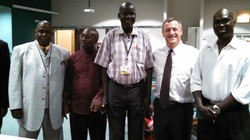For more than 20 years now, the Presbyterian Church (U.S.A.) has invited leaders from partner denominations around the world to come to the U.S. to meet and worship with Presbyterians. Since the beginning, more than 220 International Peacemakers from 57 countries have taken part in the program, giving church leaders a firsthand look at the challenges and rewards of serving Christ—even in the most difficult conditions.
“Our guests have shared their stories of love, pain, suffering, and victory, inspiring churches and synods to launch new ministries,” says Carl E. Horton, coordinator of the PC(USA) Peacemaking Program. “We often hear from churches who say peacemakers have encouraged them to do more to reach a lost world.”
Horton says the program invites speakers from across the world, but specifically focuses on countries where people are continually faced with the threats of violence.
“An international peacemaker is an authentic voice and shares stories of personal experience,” he says. “We can read things in the media, but when a person physically comes into our midst and is living what we read and hear, it becomes more real to us.”
Sometimes, says Horton, churches have been inspired to do more in their own communities as a result of a peacemaking visit. Rev. James Ninrew is the Liaison Officer for the Presbyterian Church in South Sudan and was among the group of peacemakers speaking in the US last fall. He is a founding member and sits on the board of directors of the Nuer Peace Council, chairperson of the South Sudan Action Network on Small Arms, executive director of Assistance Mission for Africa and founding member of the South Sudanese Network for Democracy and Election.
The Orangewood Presbyterian Church in Phoenix, Arizona, has an African fellowship and last year, leaders scheduled Ninrew to speak at a service.
“We decided to invite not only our church and fellowship, but also other African immigrant congregations in the area,” says Rev. Ken Page, Orangewood pastor.
Orangewood’s fellowship is mostly Burundians, Rwandans, Tanzanians and Congolese, but they also knew of some South Sudanese refugees in Arizona.
“One of the churches we invited was a congregation from South Sudan. We held a joint worship service with preaching, singing, and praying in English, Swahili, and Nuer,” says Page. “After the service, our Burundian drumming group performed, and many of us danced, including Rev. Ninrew.”
After the service and reception, Page met with the pastor and several elders from the Sudanese congregation in Phoenix. The group told him they were looking for a place to worship and couldn’t find a church willing to let them use space for less than $700 a month.
“After several conversations, prayer and a Session meeting, the Sudanese congregation now worships at Orangewood,” says Page. “Right now, they are just using space, but we are working on ways to partner in mission, Vacation Bible School, youth, and more. It turns out that most of our South Sudanese members were Presbyterians in their country.”
Horton believes the peacemakers not only give church members an opportunity to learn about life in other countries, but can help churches become more aware of issues in our own country.
“We see increasing awareness of race-based violence in the US, so it seems appropriate for us to engage with partners who have been ministering in this type of environment, many of them for a long period of time,” he says. “Peacemakers come to share the love of Jesus Christ with those who are victims and perpetrators of violence.”
The PC(USA) is hosting the Peacemakers again this year September 25–October 18. The group will gather in Louisville before and after itineration for orientation and debriefing. Visits to hosting mid-councils and institutions usually last three to five days, excluding travel. The speakers can also be scheduled to address colleges, universities, or theological institutions.
This year’s speakers will be coming from the Democratic Republic of Congo, Cuba, India, Iran, Iraq, Israel/Palestine, Rwanda, South Africa, Sri Lanka, and Syria. To schedule a speaker, go to https://www.presbyterianmission.org/ministries/peacemaking/international-peacemakers/.
“You never know what God will do. God used a visit by an International Peacemaker to launch my congregation into its second African immigrant ministry,” says Page. “We look forward to a wonderful partnership.”

